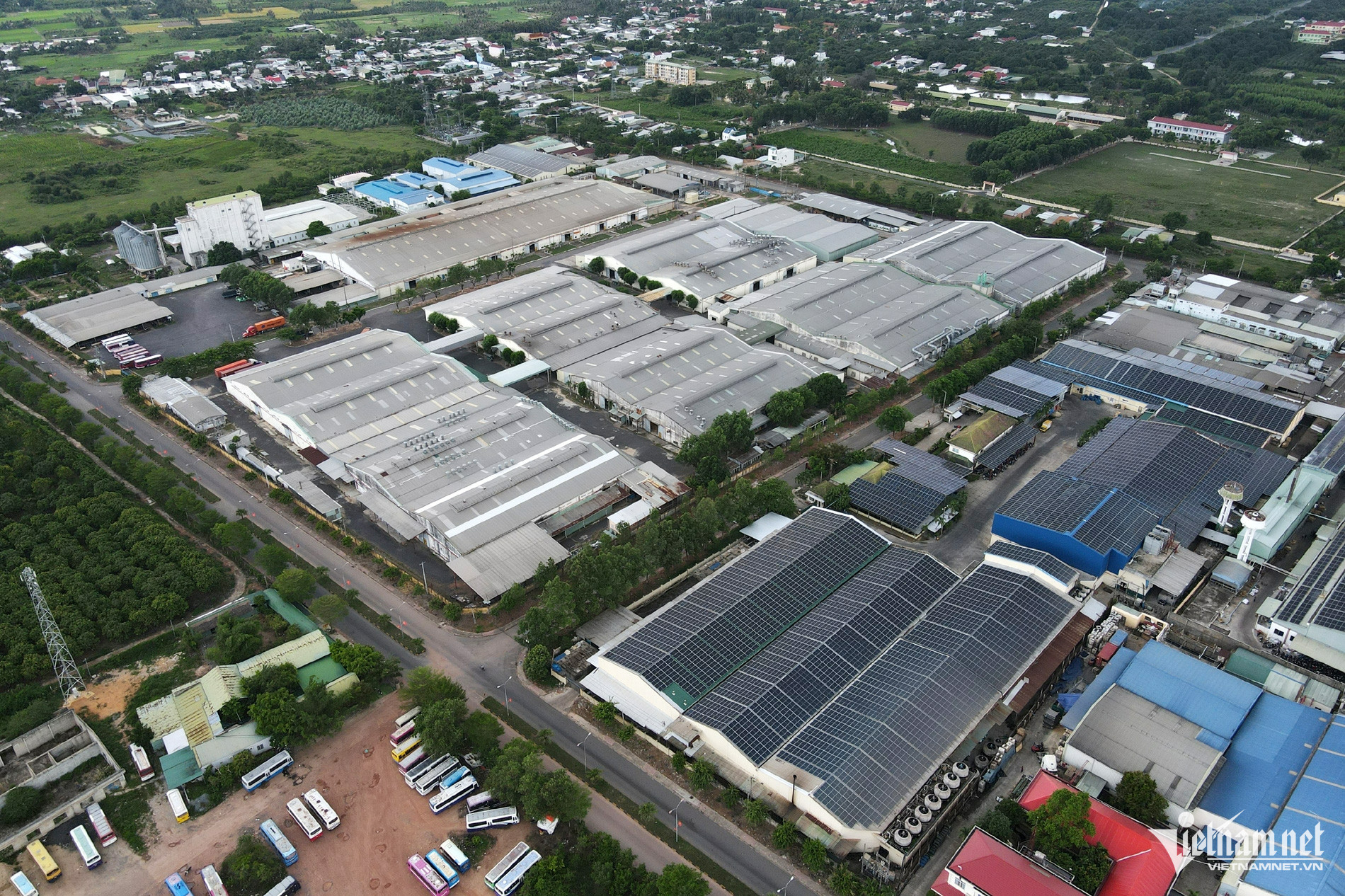Editorial note
Vietnam's economic growth recovery in the first half of 2024 is evident, with GDP in the second quarter reaching nearly 7%, bringing GDP growth in the first half to 6.42%.
Contributing to this recovery is the significant rise of several localities, including Khanh Hoa's remarkable rebound after two years of struggling due to the Covid-19 pandemic. Changes in mindset and actions, along with the ability to embrace the 'green' trend, have led to impressive growth figures and numerous innovations in this locality.
The series "Khanh Hoa Reinvents Growth Drivers" by VietNamNet describes this locality's journey of overcoming difficulties and seizing new trends.
Part 1: Green growth and innovation drive Khanh Hoa’s economic rebound
Part 2: High-tech offshore farming: A billion-dollar industry for Khanh Hoa fishermen
Part 3: Khanh Hoa's green revolution: Sea grapes transform lives and environment
Part 4: From abandoned land to eco-tourism success: Khanh Hoa’s green revolution
Lessons on diversifying growth drivers
In an exclusive interview with VietNamNet, Mr. Tran Hoa Nam, Vice Chairman of the Khanh Hoa Provincial People's Committee, discussed the province's economic recovery and its strategies for sustained growth and green development. Khanh Hoa's economic growth rate reached 10.35% in 2023, ranking fourth in the country, and is projected at 12.7% in the first half of 2024, placing it second nationwide.
What has driven Khanh Hoa's high growth in 2023 and the first half of 2024?

Tran Hoa Nam: The completion and operation of the Nha Trang - Cam Lam and Cam Lam - Vinh Hao highways have significantly boosted regional connectivity, paving the way for new development opportunities and acting as catalysts for provincial growth.
Furthermore, Khanh Hoa has ramped up efforts in investment attraction, trade promotion, tourism stimulation, and enhancing its image. The province has particularly focused on expanding flight routes to accommodate tourists, with currently 17 daily flights from South Korea, 16 from China, and between 5 to 7 weekly flights from Thailand, Kazakhstan, and Malaysia.
These initiatives have led to a robust recovery and growth in the local tourism sector. Tourism revenue in 2023 reached VND 33.9 trillion, marking a 2.4-fold increase over 2022. For the first half of this year, revenue is estimated at VND 27 trillion, doubling the figure from the same period last year.
Having experienced two consecutive years of negative growth during the Covid-19 pandemic, what lessons has Khanh Hoa learned in diversifying growth drivers to avoid sudden shocks?

Tran Hoa Nam: Indeed, it's important to recognize that previously, Khanh Hoa's economic structure was unbalanced, with tourism services contributing over 50% to the province's GRDP. This heavy reliance left the local economy vulnerable when COVID-19 struck, leading to negative growth in 2020 and 2021.
From this experience, we have learned valuable lessons about the necessity of diversifying growth drivers. It is essential to avoid dependence on a few sectors, markets, or products and to enhance the competitiveness and resilience of the local economy against sudden external shocks.
In response, Khanh Hoa is committed to shifting its growth model to one that emphasizes balance, diversification, value addition, and efficiency. A key focus is on developing the marine economy, which includes large-scale concentrated aquaculture; the high-tech processing and manufacturing industries; logistics services; the energy industry; and the digital economy. Tourism remains the spearhead economic sector.
Efforts will continue to boost exports, expand into new markets, stimulate consumption, and promote trade to attract both domestic and international tourists. Special attention will be given to enhancing our presence in markets like South Korea, Singapore, Malaysia, Thailand, and India to adjust the structure of international tourists and aim for sustainable development.
A critical strategy is to expedite the implementation and operation of key infrastructure investment projects, especially those enhancing regional transport connectivity, while improving the effectiveness of investment promotion, facilitating the growth of the private sector, and fostering integration into the global value chain.
Additionally, Khanh Hoa will focus on administrative reform, improving the business environment, promoting digital transformation, and pursuing a green transition. There is also an emphasis on the circular economy and new industries such as the semiconductor industry and artificial intelligence, which will further diversify and strengthen the economic foundation.
How is Khanh Hoa addressing the issue of officials avoiding responsibility?

Tran Hoa Nam: Khanh Hoa has been grappling with issues of officials shirking responsibilities, a problem highlighted by a marked aversion to accountability among some local government workers. This issue has been particularly pronounced following inspections that revealed infractions in various sectors such as construction, finance, land, and environmental management during the 2010-2015 and 2015-2020 terms.
The repercussions of these findings were significant, with many officials and public servants demonstrating a diminished willingness to tackle challenges, thereby slowing the administrative progress and affecting the quality of governance.
At the mid-term conference of the Provincial Party Executive Committee for the 2020-2025 term, it was noted that a culture of fear over making mistakes, along with evasive behaviors, were undermining the efficiency and quality of work.
Addressing the root of this 'fear of responsibility,' Khanh Hoa is now adopting more dynamic inspection and oversight techniques. The emphasis is on enhancing transparency and promoting a culture of innovation and accountability, encouraging officials to embrace a more proactive and courageous approach.
The province is intensifying the scrutiny of public service operations through regular and surprise inspections. Those found to be underperforming, or avoiding their duties, are subject to reassignment or replacement to ensure that public projects do not stall and that tasks meet the expected standards.
Moreover, the province is urging departments to offer more robust support to officials, helping them overcome challenges and adjust to the demands of their roles. There is also a push to recognize and reward those who exhibit integrity, initiative, and creativity in their duties, fostering a positive and accountable work environment.
The Government's Net Zero commitment requires changes in thinking and actions down to each locality, business, and citizen. How will Khanh Hoa change in planning and implementing socio-economic development from this directive?

Tran Hoa Nam: In light of the Government's Net Zero commitment, Khanh Hoa faces a mix of opportunities and challenges. The province is positioned to attract investments in green projects, clean energy, and sustainable infrastructure, essential for facilitating a green transition. These initiatives aim to bolster innovation, nurture the digital and green economies, and generate new drivers for economic growth.
However, the path to developing a green economy and achieving a green transition encounters significant obstacles. In Vietnam, the mechanisms, policies, and legal frameworks necessary for implementation are still in development. Moreover, there is a general lack of awareness about the importance of conserving natural resources and the environment. Financial challenges also persist, with insufficient funding to meet the objectives of fostering a green economy and facilitating a green transition. Additionally, the prevalent production technology in Vietnam tends to be outdated, characterized by high energy consumption and inefficient waste management.
Local enterprises, particularly small and medium-sized ones, face limitations in resources, technology, and manpower necessary for adopting green production practices. Furthermore, the environmental awareness and responsibility among businesses and the general populace are still evolving and require significant enhancement.
To address these challenges, the Provincial People's Committee has endorsed the Green Transition and Green Growth Plan for Nha Trang City for 2024-2030. Similarly, a comprehensive Green Transition Plan for the entire Khanh Hoa Province has been drafted, targeting key sectors such as green agriculture, green industry, green tourism, green urban infrastructure, green transportation, and green lifestyles. This plan is anticipated to receive approval in August.
How will the province's investment attraction need to change to meet the 'green' criteria in the context that Khanh Hoa wants to diversify growth drivers, not just rely on tourism?
Tran Hoa Nam: Environment and technology are paramount for the province in selecting investment projects. Committed to a selective approach, the province prioritizes projects that employ high technology, clean technology, and environmental sustainability. This strategy focuses on reducing emissions, producing green products, and delivering sustainable value. Conversely, projects that risk environmental pollution or have high energy consumption will be systematically rejected.

Despite the diversification of growth drivers, tourism will still significantly contribute to the province's GRDP. How will this strength be directed to meet green and sustainable development?
Tran Hoa Nam: The year 2023 represents a significant turning point for the recovery of tourism in Khanh Hoa. Total tourist arrivals surged by 182% compared to the same period in 2022, with the number of international tourists increasing eightfold.
Recognizing green and sustainable tourism as an essential trend, the province has strategically planned and developed green tourism spaces and projects to attract investors, promoting "responsible tourism" initiatives. Additionally, businesses are encouraged to develop green tourism products and services while minimizing the use of single-use and non-recyclable materials.
On the journey towards 'green' transition and aiming for Net Zero as committed by the Government, what message do you want to send to businesses and citizens?
Tran Hoa Nam: Embracing the 'green' path, Khanh Hoa recognizes the critical need for the business community and its citizens to unite and collaborate.
In the green transition process, businesses hold a particularly pivotal and decisive role. Therefore, each business must take proactive steps, fostering innovation and boldly transitioning to green technology. This shift towards green production will not only create high-value and sustainable products but also enhance competitiveness in the market - key factors in business success.
I also hope that our citizens will elevate their commitment to green living, forming habits that favor the purchase and consumption of green, clean, and environmentally friendly products and services. Remember to take action to protect the environment and use resources and energy sparingly. Consider these actions both a great responsibility and an honor for each individual.
The provincial government is committed to supporting this journey, providing continuous support and creating favorable conditions, particularly through mechanisms and policies, to aid businesses and citizens alike in achieving green production and consumption, all toward a future of sustainable development.
Tam An, Xuan Ngoc, Hien Anh